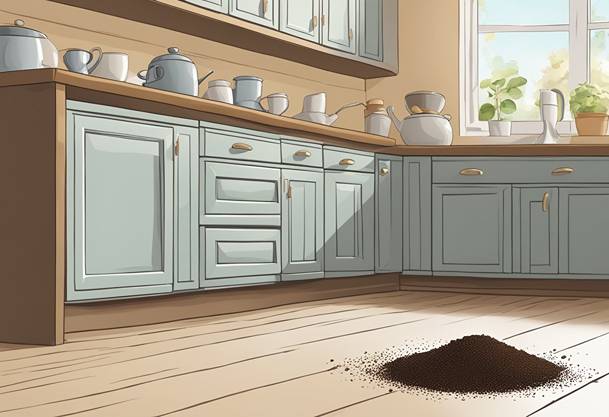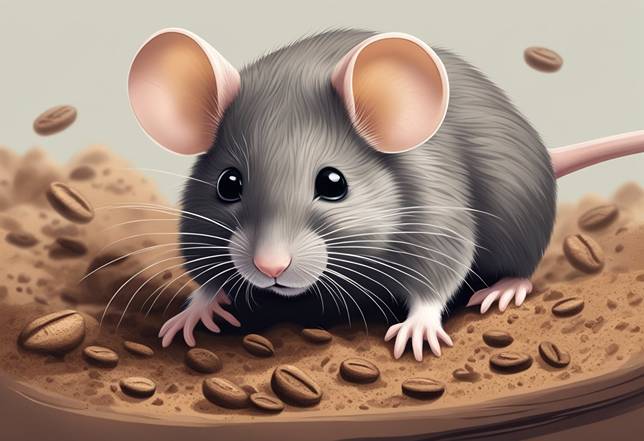Have you ever pondered the question “do mice like coffee grounds?” If so, you’re not alone. Many people worry about attracting unwanted rodent guests while disposing of their daily coffee waste.

Fear not, coffee enthusiasts! Mice and rats generally don’t fancy the smell of coffee grounds, used or dry. In fact, rodents tend to avoid caffeine-containing products, making coffee grounds relatively safe for disposal in your garden or compost bin.
As caffeine has a bitter taste and a strong aroma, these little critters often find it unappealing.
Key Takeaways
- Mice and rats typically avoid the smell of coffee grounds
- Caffeine’s bitter taste and strong aroma are unappealing to rodents
- Coffee grounds can be safely disposed of in gardens and compost bins without attracting mice
The Scent of Seduction: Do Mice Like Coffee Grounds?

Brewing Mysteries: What Does Coffee Do to Mice?
Ah, coffee – the lifeblood of many humans. But have you ever wondered what it might do to those pesky little mice?
They’re quite the curious creatures with their ever-present sniffing noses. So, it’s natural to ask – do mice like coffee grounds?
Believe it or not, our furry friends hold no love for caffeine. Surprisingly, they’re not attracted to coffee grounds, whether they’re dry or used.
You might think rodents would go nuts over the strong, rich aroma of coffee, but their general aversion to caffeine keeps them at bay.
Oddly enough, we humans seem to be the only mammals addicted to this marvelous liquid.
Now, that doesn’t mean you can go ahead and sprinkle your leftover grounds all willy-nilly around your house.
Mice may not like them, but they won’t leave their cozy homes just because of a mild coffee scent.
Java Juxtaposition: Mice vs. Coffee Beans
Mice have a keen sense of smell, which is both a strength and a weakness.
Coffee grounds have a powerful scent due to compounds like caffeine, which boasts a bitter taste and intense aroma.
On the flip side, mice are repelled by this aroma, making coffee grounds an interesting tool in the battle against them.
Here are some ways to use coffee grounds effectively to repel mice:
- Place coffee grounds in small, breathable bags
- Distribute them in areas prone to mice activity
- Refresh the coffee grounds frequently to maintain the scent
Remember, it’s important to ensure proper ventilation in addition to using coffee grounds.
Overpowering your home with the smell of java may keep the mice away, but it won’t make your living situation bearable either.
The relationship between mice and coffee grounds is like a Shakespearean play – full of drama and intrigue.
Whether you’re a coffee enthusiast or a concerned homeowner, you now possess the knowledge to use coffee to your advantage in the age-old battle against these furry invaders.
The Bean Barrier: Coffee Grounds as Mouse Deterrants

Used Coffee Grounds: The Pest Repelling Prowess
If you’ve ever had to deal with unwelcome rodents in your home, you’re probably on the hunt for a natural and cost-effective solution.
Well, look no further than your morning cup of joe!
There’s evidence that suggests used coffee grounds can actually repel mice.
Just place these aromatic morsels in small, breathable bags and place them strategically around areas prone to mouse activity.
Make sure to refresh them every now and then to keep the scent strong. It’s like setting up a coffee-scented force field to protect your home!
Caffeine Conundrums: Is Coffee Toxic to Tiny Trespassers?
Now, you might be wondering if coffee itself is toxic to mice.
While there’s debate on this topic, the general consensus is that it’s not the caffeine that repels the mice, but rather the strong aroma.
Rodents generally avoid coffee grounds, so the grounds act as more of a deterrent than a dangerous substance.
So you can enjoy your daily brew without feeling guilty about harming your tiny uninvited guests.
The Great Debate: Coffee Grounds vs. Cheese as Bait
Now that we’ve established coffee grounds as a mouse deterrent, let’s have a little fun and compare them to something you might typically find in a mousetrap: cheese.
Coffee Grounds:
- Pro: Aromatic and natural, not usually harmful to rodents
- Con: Need to be replaced frequently to maintain effectiveness
Cheese:
- Pro: A classic bait choice for enticing mice
- Con: Your tiny trespassers may actually prefer other foods over cheese
It’s clear that each has its merits in the world of pest control.
While cheese has been known to lure rodents into traps, coffee grounds serve as a preventive measure.
So why not combine the two?
Use coffee grounds to repel rodents from your home and save the cheese for those special occasions when you need a fail-proof trap.
In conclusion, your used coffee grounds may hold more power than you ever imagined.
Give them a second life as a rodent-repellent and laugh in the face of mice trying to invade your home.
Unconventional Aromatherapy: Other Pungent Pals and Foes

Minty Fresh or Mice Fiasco? The Tale of Peppermint
Oh, the lovely aroma of peppermint! While it may be pleasant to your olfactory senses, it turns out that mice aren’t quite fans of the scent. In fact, peppermint boasts a reputation as a natural repellent for these critters.
By soaking cotton balls in peppermint oil and strategically placing them around your home, you’ll not only fill your abode with a refreshing aroma but also create an invisible barrier for those furry little invaders.
Just keep in mind that the power of peppermint isn’t foolproof, so don’t go thinking you can ward off an entire mice colony with just a few drops of oil.
However, its strong odor can be a handy first line of defense and, at the very least, keep your home smelling minty fresh.
The Essence of Evasion: Eucalyptus, Cinnamon, and More
Why stop at peppermint? Unleash your inner herbalist and take advantage of other aromas mice would rather avoid.
Consider, for example, the invigorating scent of eucalyptus. With its refreshing and menthol-like properties, eucalyptus oil can be another useful ally in your ongoing battle against rodent intruders.
And what can we say about cinnamon that you don’t already know?
Besides being a fantastic addition to your apple pie, cinnamon’s unique scent is yet another deterrent mice would rather evade.
Sprinkle some cinnamon powder near suspected entry points, and you’ll send mice packing – just like you would do with the eucalyptus oil.
If you’re willing to take a more nose-wrinkling approach, consider the knock-out stench of ammonia.
It may not possess the lovely, spicy scent of cinnamon or the invigorating aura of eucalyptus, but the potent smell of ammonia can mimic the odor of predators’ urine, keeping curious mice at bay.
So there you have it! While coffee grounds may not be the silver bullet against furry trespassers, you can always rely on a variety of other scented strategies to keep rodents at arm’s length.
Now go forth and experiment with your newfound arsenal of unconventional, rodent-repelling aromatherapy techniques!
| Aspect | Details |
|---|---|
| General Attraction to Coffee | Mice are generally not attracted to coffee grounds. The strong smell of coffee can act as a deterrent for them. |
| Use as a Deterrent | Coffee grounds are sometimes used as a natural repellent to keep mice away from certain areas. The scent of coffee can mask other food smells that might attract mice. |
| Effectiveness | The effectiveness of coffee grounds as a deterrent can vary. While they may work for some, others may not find them as effective. It depends on the severity of the infestation and the specific habits of the mice. |
| Mechanism | The strong aroma of coffee grounds can overwhelm the mice’s sensitive sense of smell, making it less likely for them to enter treated areas. |
| Other Benefits | In addition to potentially repelling mice, used coffee grounds can be beneficial for composting and as a soil amendment for plants. |
| Alternative Uses | Instead of disposing of coffee grounds, using them as a deterrent for pests like mice, slugs, and ants can be an environmentally friendly option. |
| Precautions | While coffee grounds may help deter mice, they should not be relied upon as the sole method of pest control. |
Final Words
The relationship between coffee grounds and the presence of rats and mice is a subject of interest for many, especially those seeking natural deterrent methods for pests, you’re dealing with a significant thing here.
While the strong aroma of coffee is beloved by many humans, it’s commonly believed that rats and mice are not fans of the scent.
However, the reality of whether coffee grounds can help repel these rodents is more nuanced.
Coffee grounds have a strong smell that, in theory, might deter rats and mice due to their dislike of intense aromas.
Some claim that the strong scent of coffee grounds can effectively deter mice and even deter rats when used in problem areas or near entry points.
Yet, the efficacy of coffee grounds alone as a foolproof solution to mouse infestation is debatable.
While they may avoid areas treated with coffee grounds or dislike the strong smell, relying solely on coffee grounds for effective pest control may not be advisable.
It’s essential to understand that coffee grounds can attract other pests like ants and fruit flies due to the food source they represent, especially when mixed with other food waste in a compost pile.
Hence, while coffee grounds might offer a natural deterrent to some extent, they could inadvertently attract other pests if not used carefully.
For those dealing with a significant rodent issue, integrating coffee grounds as part of a broader pest control strategy might be more effective.
This could include sealing any potential entry points, using sealed containers for food storage, and possibly combining coffee grounds with other natural repellents like clove oil on cotton balls.
Ultimately, while coffee grounds might have some deterrent effect on mice and rats due to their strong scent, they should not be relied upon as the sole method of pest control.
Professional pest control services or more proven natural rodent repellents should be considered, especially for more severe infestations.
The key is integrating multiple methods to create a more comprehensive approach to deterring these unwelcome guests.
Frequently Asked Questions

Can coffee grounds turn my garden into a mouse rave or they’re a party pooper?
Surprisingly, coffee grounds don’t really attract mice and might even act as a repellent. So, if you’re considering throwing a mouse rave in your garden, you might want to skip the coffee grounds.
On the other hand, if keeping the mice away is your goal, spreading used coffee grounds around could be an option.
What’s the deal with Mickey Mouse and his supposed love-hate relationship with espresso leftovers?
We can’t speak for Mickey personally, but the general mouse population seems to have a complicated relationship with coffee grounds.
While some sources claim that the pungent smell of coffee grounds attracts rodents, others indicate that rodents don’t particularly like the smell and may even be repelled by it.
We’ll leave Mickey’s preferences to the imagination.
Is a coffee ground moat the secret to a mouse-free kingdom?
Sadly, a coffee ground moat may not be entirely effective in creating a mouse-free kingdom.
Although there is a claim that dry coffee grounds may deter mice, it likely won’t be very effective.
You might want to consider other methods, like traps or vigilant cleaning to protect your palace from whiskered invaders.
Will mice swipe left on a profile smelling of coffee remains?
The dating life of mice remains a mystery, but it seems like the smell of coffee might not be a deal-breaker.
While rodents do not necessarily love the smell of coffee, they also don’t seem to be completely repelled by it.
In other words, mice might not swipe left solely based on the coffee aroma, so the cafe might not be a bad spot for their first date.
Do mice get their caffeine fix from our discarded java or do they prefer a decaf environment?
Mice don’t seem to enjoy coffee grounds like we do, as coffee might be harmful to them.
The caffeine content could cause rapid breathing, increased heart rate, and muscle tremors, so it’s crucial to say they probably don’t go looking for discarded java for their caffeine fix.
As far as we know, mice might prefer a decaf environment.
Are coffee grounds the cologne of choice for repelling whiskered freeloaders?
While it’s still up for debate, there’s a possibility that coffee grounds may help in repelling mice.
One approach is to accumulate used coffee grounds and spread them in areas where mice have been spotted.
But remember, coffee grounds might not be foolproof, and it’s always a good idea to explore additional pest control methods.

